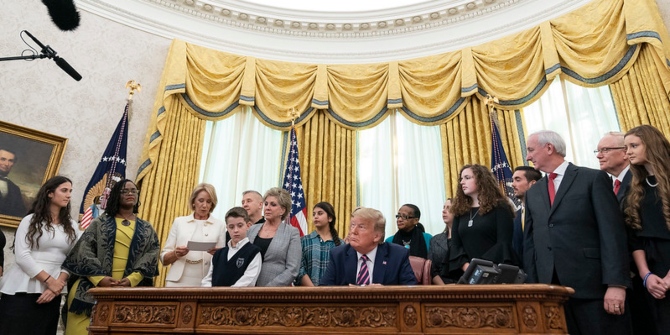 In the 2016 and 2020 US Presidential elections, evangelical Christians voted overwhelmingly for Donald Trump. Katie Gaddini unpicks the political relationship this type of Christianity had with Donald Trump, how it changed in 2020, and what it means for American politics moving forward.
In the 2016 and 2020 US Presidential elections, evangelical Christians voted overwhelmingly for Donald Trump. Katie Gaddini unpicks the political relationship this type of Christianity had with Donald Trump, how it changed in 2020, and what it means for American politics moving forward.
- On 15 June, LSE Religion and Global Society, together with the US Centre and Department of International Relations, is hosting a free LSE Public Lecture, Religious Freedom under the Biden Administration. Ahead of that event, RGS and the US Centre’s USAPP Blog have launched a new joint series focusing on religion in American society, bringing in experts to explore the relationship different faith groups have with American society. Read other posts in this series.
In 2016, 81% of evangelical Christians voted for Donald Trump for the 45th President of the United States. Although evangelicals have aligned with the Republican party for decades, this vote amounted to the largest evangelical vote in nearly twenty years. Many journalists, academics, and even some Christian leaders reacted to the 2016 election with dismay at what they saw as the incongruency between evangelical values and Trump’s behaviour, including two divorces, numerous affairs, and countless indiscretions. Four years later, these same journalists, academics and Christian leaders waited to see what Trump’s evangelical base would do at the 2020 Presidential election. Would an impeachment trial, allegations of sexual misconduct and hundreds of controversial Twitter posts be enough to dissuade evangelicals from voting for Trump again?
It turns out the answer is a resounding no. Exit polls from the 2020 election estimate that anywhere from 76-81% of evangelicals voted for Trump, meaning that his evangelical base remained committed. For those of us who research evangelicalism and politics these figures do not come as a surprise. For one thing, evangelicals’ approval for Trump remained high throughout his presidency, largely because Trump introduced and upheld the political issues that evangelicals hold dear, including pro-life, pro-Israel, and pro-abstinence-only education policies. But there are other, more nuanced reasons that evangelicals voted again for Donald Trump as President, which I have discovered through my on-going qualitative research on evangelical Christianity and politics in America. Here, I offer some brief dispatches from the field – bearing in mind that “the field,” just like religion and politics moreover, is fluid and ever-changing.
Revisiting 2016
When I interviewed American evangelicals and British evangelicals in 2016, I wanted to compare their attitudes towards two major political events: the presidential election and Brexit, respectively. As has been well-documented by now, American evangelicals do not separate their faith from politics. They see political engagement as a civic responsibility that is deeply entwined with and influenced by their faith. Interestingly, British evangelicals feel similarly, even though they tend to align with political issues rather than political parties. The two churches that my research participants attended shared a close connection: they sang the same worship songs on Sunday, they read the same Bible-study books, pastors often moved between the two churches, and congregants made pilgrimage-like trips across the Atlantic to visit one another. Their views on how faith intersects with politics, however, differed dramatically. While the American evangelicals I spoke with voted for Trump because of his strict immigration policies, their British counterparts voted against Brexit for the very same reason. Both groups relied on scripture to defend their position and both saw immigration as intimately linked to their faith. However, as this research demonstrates, what it means to be an ‘evangelical’ in the US is different from in the UK, even when key tenants of their faith and religious practices remain the same. Like all identities ‘evangelical’ is an inherently empty category and is dependent on its social-historical-political context for meaning. And in 2016, the interaction of fundamental identities – religious, political, and national – led to very different priorities for these two groups of evangelicals.
2020
Four years later I once again found myself conducting interviews with evangelicals ahead of a presidential election. However, my findings so far show that although immigration remains a top concern for American evangelicals, it is no longer the top concern. Without a doubt, there are two major events of the past year which shaped evangelicals’ political priorities when it came time to vote last November. Firstly, the Black Lives Matter (BLM) protests, which ripped across the United States in the aftermath of George Floyd’s death in June 2020, became a top concern for evangelical voters. For evangelicals living near cities in blue states, such as Seattle, where the protests were especially active, the BLM protests strengthened their support for Trump, who they saw as a stabilising force and a President committed to stamping out identity politics. Moreover, they view Trump as committed to challenging mainstream liberal media, which often emphasised the peacefulness of the BLM protests in reportage, instead of the violence—and symbolised a much larger battle conservative evangelicals are waging against the censorship of free and fair speech.

“Announcement of the Guidance on Constitutional Prayer” by Trump White House Archived is Public Domain.
The second concern for evangelical voters last November was the Covid-19 pandemic. In the words of one of my research participants who works for a Republican lobbying firm: “If it wasn’t for the pandemic, Trump would have won again, no question.” He stated this opinion in reference to Republican voters overall, yet for the evangelicals I interviewed, the pandemic solidified their support for Trump. As an anti-establishment President waging war with the mainstream media and the World Health Organisation, Trump was the last stalwart of freedom in the era of lockdowns, mass vaccination programmes and mandatory mask-wearing. For a group deeply dedicated to freedom – the freedom to bear arms, the freedom of speech, the freedom to worship as they want – the restrictions that politicians have imposed in the name of the Covid-19 pandemic, have caused many evangelicals to cling even more staunchly to their understanding of freedom, which they believe is the bedrock of American democracy. And which they fear is in grave danger under a Democratic President and an on-going pandemic.
What Now?
Six months later, even though Trump is no longer President, his brand of politics – irreverent, anti-establishment, and determined – continues. The question is: what now? What will happen with the 74 million people who voted for Trump in 2020, significant numbers of which are evangelical Christians? To which politicians, social movements, and issues will Trump’s evangelical base turn? Both well-established and up-and-coming GOP politicians who espouse Trumpist ideology, such as Madison Cawthorne, Ted Cruz, and Cindy Hyde-Smith, continue to garner the favour of many evangelicals, as evidenced by the Cruz and Hyde-Smith’s recent visit to the US-Mexico border. Will one of them run in the 2024 Presidential election?
For a scholar of evangelical Christianity, I am asking all of these questions, as well as wondering how the imbrication of religion and politics in America will twist and turn over the coming years shaping both evangelical culture and the political impact to which it aspires.
- A version of this article appeared originally at the LSE Religion and Global Society blog.
Please read our comments policy before commenting.
Note: This article gives the views of the author, and not the position of USAPP – American Politics and Policy, nor the London School of Economics.
Shortened URL for this post: https://bit.ly/3y1PRIg






